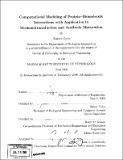Computational modeling of protein-biomolecule interactions with application to mechanotransduction and antibody maturation
Author(s)
Zyto, Aurore
DownloadFull printable version (23.41Mb)
Other Contributors
Massachusetts Institute of Technology. Biological Engineering Division.
Advisor
Bruce Tidor and Roger D. Kamm.
Terms of use
Metadata
Show full item recordAbstract
Cell survival, growth, differentiation, migration, and communication all depend on the appropriate combination of specific interactions between proteins and biomolecules. Therefore, understanding the molecular mechanisms influencing protein-biomolecule binding interactions is important both for fundamental knowledge and as a foundation for therapeutic applications and biotechnology. This thesis presents two applications of computational modeling to study protein-biomolecule binding in different contexts. First, we sought to characterize effects of applied mechanical force on protein structural and biochemical properties. Despite growing experimental evidence of force-regulated cell behavior, the molecular mechanisms involved in force sensing and transmission are still largely unknown. We adapted a free energy method to directly compute the change in binding affinity upon force application. Our simulations demonstrated that differential responses in the bound and unbound state of a protein-ligand complex can lead to graded force-modulation of binding affinity. Application to a prototypical protein system - the helical bundle complex of a paxillin fragment bound to the FAT domain of focal adhesion kinase (FAK) revealed several structural mechanisms responsible. Second, we used computational methods to design individual mutations computed to improve binding affinity of an antibody-small molecule complex with relevance to cancer treatment. Our calculations suggested several beneficial mutations for experimental characterization. The work illustrates the value of computational modeling for understanding protein-biomolecule interactions with application to therapeutic development and advances in biotechnology.
Description
Thesis (Ph. D.)--Massachusetts Institute of Technology, Biological Engineering Division, 2008. Includes bibliographical references (leaves 100-112).
Date issued
2008Department
Massachusetts Institute of Technology. Department of Biological EngineeringPublisher
Massachusetts Institute of Technology
Keywords
Biological Engineering Division.